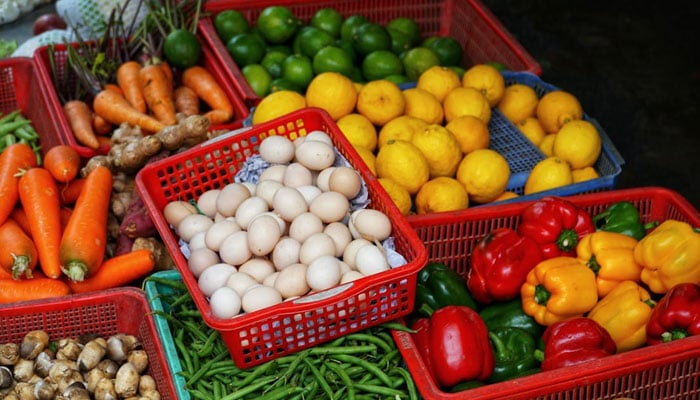Families can cut down on food waste
Rawalpindi : A significant amount of food that spoils or is left over often ends up in the trash, contributing to substantial household food waste. Spoiled food can include items such as leftover bread or rice, half-eaten sandwiches, pizza crusts, forgotten pieces of cake, stale cheese, expired milk or pickles, unattractive tomatoes, blemished vegetables or fruits, and even overly salty chutneys.
“Throwing away food places an additional burden on our waste management system, exacerbating issues of food insecurity. It also contributes to greenhouse gas emissions and is a major source of pollution,” says Anmol Fatima. “We may think that discarding an overripe banana or mango is acceptable because they will decompose. However, with inadequate waste management systems, many of these items end up in garbage bins, where they rot and release methane,” says Areeka Batool.
“Only purchase what you need and buy the quantity you can consume. Poor planning leads to more frequent shopping trips, increasing the risk of food waste. Before you go shopping, check what you already have in your refrigerator or kitchen cabinet,” advises Taqdees Zahra.
“A significant amount of food is wasted due to poor storage practices and the preference for fresh produce. Early ripening and rotting are common reasons for food being discarded. Therefore, it’s important to know what should go in the fridge, what can be stored at room temperature, and when to move certain items to the fridge after they have ripened,” says Gul-e-Raana.
“To maximize freshness and flavor, store essential items like onions, potatoes, tomatoes, and garlic in your pantry at room temperature. It is crucial to wait to wash berries and grapes until just before eating, as excess moisture can lead to mold growth. Remember, fruits such as apples and bananas emit ethylene gas, so be sure to keep them separate to prevent premature ripening. Finally, handle leafy greens gently, as they can wilt quickly without proper care,” advises Durray Shahwar. “I follow the first-in, first-out methodology when storing cooked food in the fridge. I also use clear containers with date labels to keep track of what I have,” says Zillay Huma.
“Failing to read the labels that provide storage instructions for food items is one of the common mistakes people make. If the label suggests storing an item in an airtight container, it is important to follow those instructions; no one wants soggy biscuits or stale snacks. If you’re using the original packaging, make sure to squeeze out all the excess air and securely close the bag with a rubber band or clip,” advises Shehr Bano.
Kaneez Zainab adds, “Food waste often occurs due to overcooking or burning, preparing large quantities, and serving excessive portions on plates. When our lives are filled with relatives and friends who enjoy eating, it can lead to significant food waste.”
-
 Fukushima Decommissioning: Japan Deploys Snake-like Robot To Remove Nuclear Debris
Fukushima Decommissioning: Japan Deploys Snake-like Robot To Remove Nuclear Debris -
 Brenda Song Turns Macaulay Culkin's 'Home Alone' Into 'terrible' Lesson: 'Children Have To Be A Little Scared'
Brenda Song Turns Macaulay Culkin's 'Home Alone' Into 'terrible' Lesson: 'Children Have To Be A Little Scared' -
 MrBeast Vows To Book Only Starlink-equipped Flights As Global Airline Adoption Surges
MrBeast Vows To Book Only Starlink-equipped Flights As Global Airline Adoption Surges -
 Kim Jong Un Says North Korea Ready To ‘get Along’ With US But Sets Key Condition
Kim Jong Un Says North Korea Ready To ‘get Along’ With US But Sets Key Condition -
 Andrew Fears What Comes Next As Jeffrey Epstein Scandal Deepens
Andrew Fears What Comes Next As Jeffrey Epstein Scandal Deepens -
 Inside Meghan Markle's 'scary' Postpartum Preeclampsia Journey
Inside Meghan Markle's 'scary' Postpartum Preeclampsia Journey -
 'Sinners' Creator Ryan Coogler's Bombshell Statement Comes To Light After Oscar Nomination
'Sinners' Creator Ryan Coogler's Bombshell Statement Comes To Light After Oscar Nomination -
 Teddi Mellencamp Pens Sweet Message As Daughter Dove Turns 6: 'Love You So Much'
Teddi Mellencamp Pens Sweet Message As Daughter Dove Turns 6: 'Love You So Much' -
 James Hetfield's Health Struggle Amid His 2026 Las Vegas Sphere Residency
James Hetfield's Health Struggle Amid His 2026 Las Vegas Sphere Residency -
 Princess Beatrice, Eugenie Are Now Facing The Same Wait As Their Parents: ‘Their Future Has To Be Decided’
Princess Beatrice, Eugenie Are Now Facing The Same Wait As Their Parents: ‘Their Future Has To Be Decided’ -
 Trump’s Tariff Turmoil Yet To Significantly Dent Growth In Emerging Economies, Despite Raising Trade Tensions
Trump’s Tariff Turmoil Yet To Significantly Dent Growth In Emerging Economies, Despite Raising Trade Tensions -
 Will There Be 'Smiling Friends' Season 4? Animated Series' Creators Make Big Announcement
Will There Be 'Smiling Friends' Season 4? Animated Series' Creators Make Big Announcement -
 Jennifer Aniston, Boyfriend Jim Curtis Prepare To Move In After 'hard Launching' Their Relationship?
Jennifer Aniston, Boyfriend Jim Curtis Prepare To Move In After 'hard Launching' Their Relationship? -
 Lamar Odom Details Struggle With Addiction And ‘amazing’ Rehab Experience
Lamar Odom Details Struggle With Addiction And ‘amazing’ Rehab Experience -
 Nvidia Vs Intel: Jensen Huang Braces Investors For Renewed Battle As Chip Wars Reignite
Nvidia Vs Intel: Jensen Huang Braces Investors For Renewed Battle As Chip Wars Reignite -
 Heidi Montag Reveals Why She Felt 'robbed' On 'The Masked Singer' After Her Elimination
Heidi Montag Reveals Why She Felt 'robbed' On 'The Masked Singer' After Her Elimination




